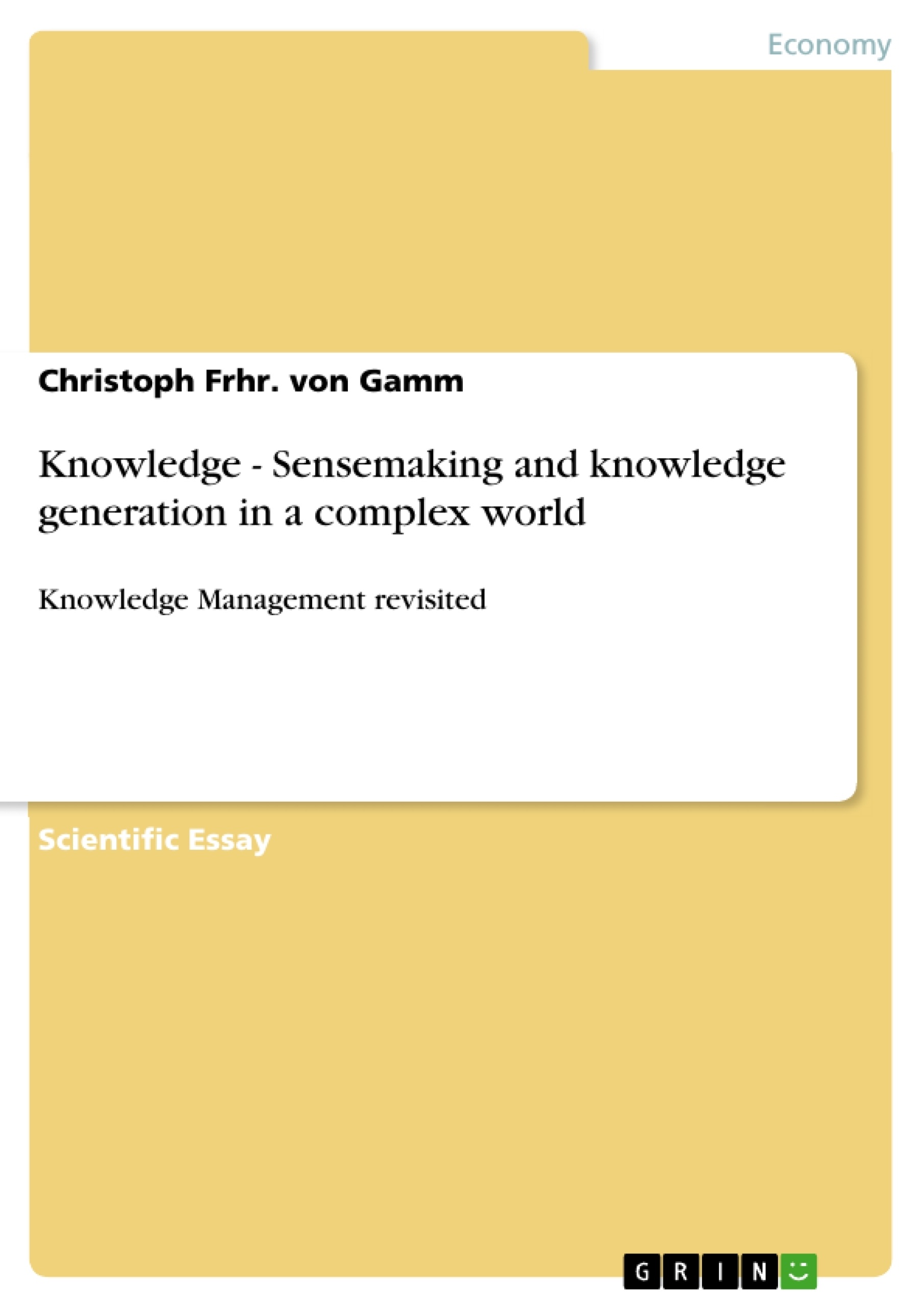Excerpt
1. The individual and collective sensemaking process
1. 1. Sensemaking
Sensemaking is a process that best can be described (Book 3) along the following tasks: Information search, Information analysis, Information synthesis, Publication and reuse. Using this sensemaking process, knowledge gets added on, at least individually or in a team, the theory says.
Very closely, this “sensemaking” process is closely tied together to Kolb’s learning cycle, and can be analogised as follows:
Abbildung in dieser Leseprobe nicht enthalten
Table: Kolb’s Learning cycle and Sensemaking tasks
It can be seen that there are close linkages between Kolb’s learning cycle and Sensemaking. As a conclusion with Kolb and Fry, who say that different people have different learning behaviour and different learning pattern is sensemaking, by being a process that goes through all different phases of Kolb’s cycle, an activity that best should be exercised in a team of people who share sensemaking amongst each other. 1
In order to reap the benefits out of this thought, a sensemaking group should be made as a team - and as location disparities require - an “Internet team” here facilitates team building and thus sensemaking.
Abbildung in dieser Leseprobe nicht enthalten
Graphic: Kolb ’ s learning cycle
1.2 The sensemaking tasks in an overview
The group has experienced different challenges in the sensemaking process - especially when it dealt with working in the topic of knowledge management - a very broad area, which apparently contains lots of fuzz and also lots of uncertainty with different viewpoints - at least as far as the Internet sources are reflecting it.
The following table will give an overview on the costs/and benefits and the tasks undertaken.
1.2.1 Information gathering
Abbildung in dieser Leseprobe nicht enthalten
Information gathering thus is a hard thing to do alone, very often, the web as a source of information has become a representation of the outside world - there are many information to find but the meaningfulness of the information needs to be always put into the right perspective. The world wide web service Lycos has for example about 123000 keyword search results on “knowledge management”, which for example makes already the search to such a broad topic like this a very difficult matter. Also, it needs to be put into consideration that the web does consist out of documents that already have been written by somebody else - thus it is not basic research but secondary research that can be undertaken using the web - and still, not all documents can be found on the web yet For more advanced research, maybe some primary research may be needed (for example to find the “unknown”).
1.2.2 Information analysis/re-use/synthesis
Abbildung in dieser Leseprobe nicht enthalten
Along with information search and finding the analysis on meaningfulness, context and mutual conclusion and exclusion of thoughts is a difficult matter. One of the most important things is to check the reliability of the source - be it by its already attained reputation or by searching at the original source or by questioning of the theory. Synthesis of information - especially if there are different authors and “schools” or thought streams - is very costly either but the benefit here is the additional gain of knowledge or even wisdom, as then some generalised knowledge onto a certain topic can be gained. The specialisation into a certain topic - on the opposite - requires direct primary research very often.
1.2.3 Information sharing and publication
Abbildung in dieser Leseprobe nicht enthalten
As it can be seen here - information publication and sharing is a very important step in the chain of a sensemaking process, as otherwise nobody else knows that knowledge has been gained.2
Still, the last step - information publication of sharing is likely to be one of the most important - as it enables others to start again the next sensemaking process.
[...]
1 One of the sensemaking findings of the team was that it makes better sense to the induction arrow (coming from Guide and Advice) into the Reflector’s part. In a team the sensemaking process does very much work along the Kolb Learning Cycle - activism and reflection might happen in a team, the theory building is a rather a task that needs to be undertaken by all people themselves.
2 With Konfuzius: Who cares if there is light in a room if nobody’s in and there are no windows?
- Quote paper
- Dipl.-Ing. Christoph Frhr. von Gamm (Author), 1998, Knowledge - Sensemaking and knowledge generation in a complex world, Munich, GRIN Verlag, https://www.grin.com/document/144885
Publish now - it's free






















Comments